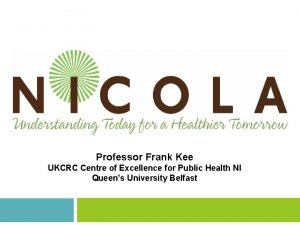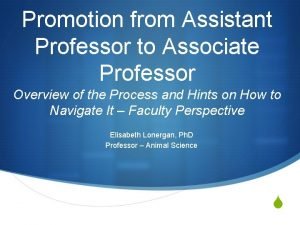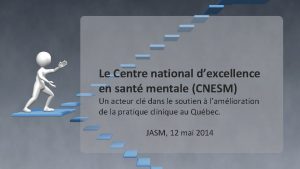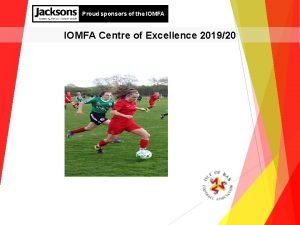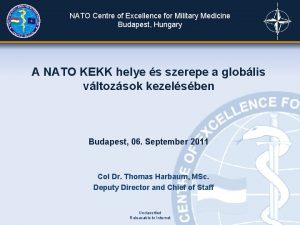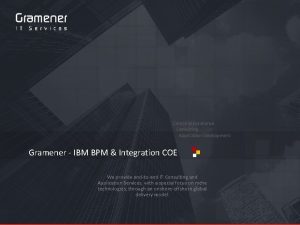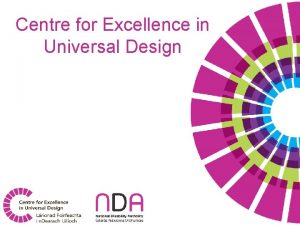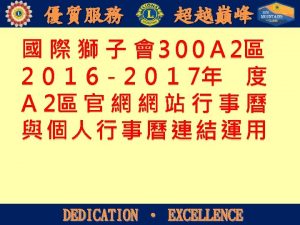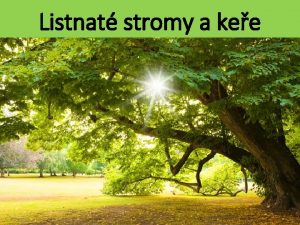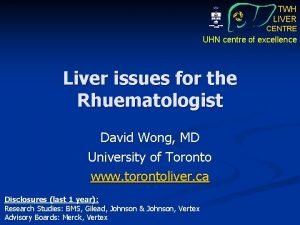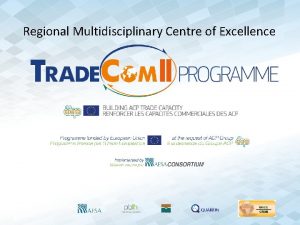Professor Frank Kee UKCRC Centre of Excellence for








- Slides: 8

Professor Frank Kee UKCRC Centre of Excellence for Public Health NI Queen’s University Belfast

NICOLA - Overview q Stratified random sample of ~8500 men/women aged 50+ in Northern Ireland q Longitudinal : Repeated measures every 2 -4 years for a period of >10 years q Computer Assisted Personal Interview (CAPI) plus self-completed questionnaires- social, behavioural, economic and environmental aspects of ageing q Health Assessment – Functional/biological markers

NICOLA – Wave 1 – CAPI q CAPI home interview collects data on social, behavioural, economic, and environmental aspects of ageing, for example: q. Socio-economic and socio-demographic factors q. Self-reported physical health, cognitive health q. Health behaviours q. Help and helpers q. Health and social care utilisation q. Medication use q. Social participation

NICOLA – Wave 1 – SCQ and HA q Self-completed questionnaires: q. Diet (including food frequency, healthy eating), mental health (including PTSD and Troubles-related trauma), loneliness, physical activity, use of ICT, personality q. Health Assessment: q. Anthropometry (e. g. , height, waist & hip measurements) q. Cardiovascular, cognitive/mental health, and respiratory function q. Physical function (e. g. , grip strength, gait & balance) q. Visual function (including imaging) q. Biological samples

NICOLA complements NI’s ageing strategies NICOLA takes a similar approach to the Active Ageing Strategy and Delivering Social Change, for example: It looks at ageing from different perspectives (i. e. , ‘joinedup’) It is focused on the long-term It aims to understand the impact of inequalities on ageing It values input from non-academic stakeholders NICOLA also maps onto the Programme for Government (Pf. G) priorities, for example: Examines attitudes to social environment, social capital Assesses legacy issues, and mental health and wellbeing Can evaluate the impact of HSC and Welfare reform (e. g. , caring needs/responsibilities over time)

Example 1: Employment/retirement NICOLA can provide the following information: Characteristics of those economically inactive Reasons for inactivity (e. g. , made redundant, retirement, gave up work to care for spouse/partner/relative) If retired, at what age, whether they planned to retire, reasons for retirement, etc. How this impacts on finances, social engagement, health, housing, etc. We will follow up with questions about renewed economic activity after retirement in later waves All of the above can be provided as sub-group analysis (e. g. , by age group, gender, socioeconomic group, region [urban/rural], etc. )

Complementarity with other studies NICOLA designed to be complementary to TILDA provide an ‘all-Ireland’ perspective of the social, behavioural, economic, and environmental aspects of ageing for those living on the island of Ireland Also been designed to complement ELSA Places Northern Ireland in the network of existing longitudinal ageing studies such as TILDA, ELSA, and HAGIS

Linkages
